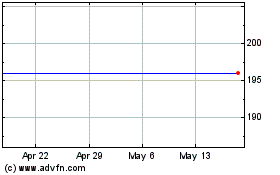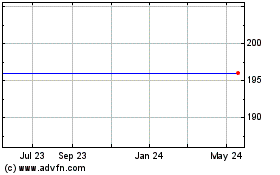Microsoft Offers EU Concessions on Outlook Access --Update
November 22 2016 - 12:43PM
Dow Jones News
By Natalia Drozdiak
BRUSSELS -- In a bid to win European Union antitrust approval of
its $26 billion acquisition of LinkedIn Corp., Microsoft Corp. has
proposed concessions that would allow rival professional social
networks access to its Outlook programs, according to people
familiar with the matter.
After the merger, the people said, rival networks would have
access to Microsoft's Outlook add-ins program -- which allows
third-party tools to integrate with Outlook -- and Outlook APIs --
or application programming interface, which allows discrete
programs to communicate with one another. Some of the networks
already have access to those Outlook programs, they added.
Microsoft's Outlook offers email and calendar management.
Among other things, the measures proposed by Microsoft would
allow for the display of profiles from other sites besides
LinkedIn, such as German business-professionals network XING, in an
Outlook calendar entry of a meeting between two or more people.
In addition, Microsoft has pledged to allow computer
manufacturers such as Dell Inc. and Hewlett Packard Enterprise Co.
to disable the LinkedIn shortcut on desktop devices, the people
said. In an earlier EU review, Microsoft had to take steps after
antitrust regulators in 2004 condemned it for bundling products
into its Windows software.
None of the remedies, however, would offer rivals direct access
to LinkedIn's pool of data -- a condition Salesforce.com Inc.,
which lost out to Microsoft in bidding for LinkedIn, has pressed
for publicly. No outside entity currently has unlimited access to
LinkedIn's data trove.
Microsoft announced its deal with LinkedIn in June and aims to
close the transaction this year. Regulators in the U.S., Canada,
and Brazil have cleared the acquisition.
The European Commission, the bloc's antitrust regulator, has
sought comment from rivals after Microsoft submitted the
concessions on the acquisition last week. Following the submission,
the EU extended its deadline to Dec. 6 to complete its review of
the merger. That could be extended further if the regulator still
has concerns about the deal and decides to open an in-depth
investigation.
The EU's antitrust authority, which has said it would scrutinize
mergers involving large amounts of data more closely, sent out
questionnaires to rivals in October posing questions about the
rough value of LinkedIn's data and whether rival sites can
replicate it.
Microsoft has argued that much of the user data on LinkedIn is
also available on other social-media sites, such as Facebook Inc.,
and that Facebook in particular should be considered as part of the
same market in the EU's review process.
However, Salesforce continues to press for regulatory scrutiny.
"We believe this deal raises significant antitrust and data privacy
issues," said Burke Norton, Salesforce's chief legal officer.
Mr. Norton wrote in an October blog post that the issue is not
whether Microsoft allows other service providers to integrate their
offerings with its products and services, but "the much richer and
irreproducible interactivity data, or metadata, to which Microsoft
alone will have access." Microsoft's exclusive access to that
information, Salesforce contends, will confer an unfair advantage
over competitors.
--Rachael King contributed to this article.
Write to Natalia Drozdiak at natalia.drozdiak@wsj.com
(END) Dow Jones Newswires
November 22, 2016 13:28 ET (18:28 GMT)
Copyright (c) 2016 Dow Jones & Company, Inc.
Linkedin Corp. Class A (NYSE:LNKD)
Historical Stock Chart
From Dec 2024 to Jan 2025

Linkedin Corp. Class A (NYSE:LNKD)
Historical Stock Chart
From Jan 2024 to Jan 2025
